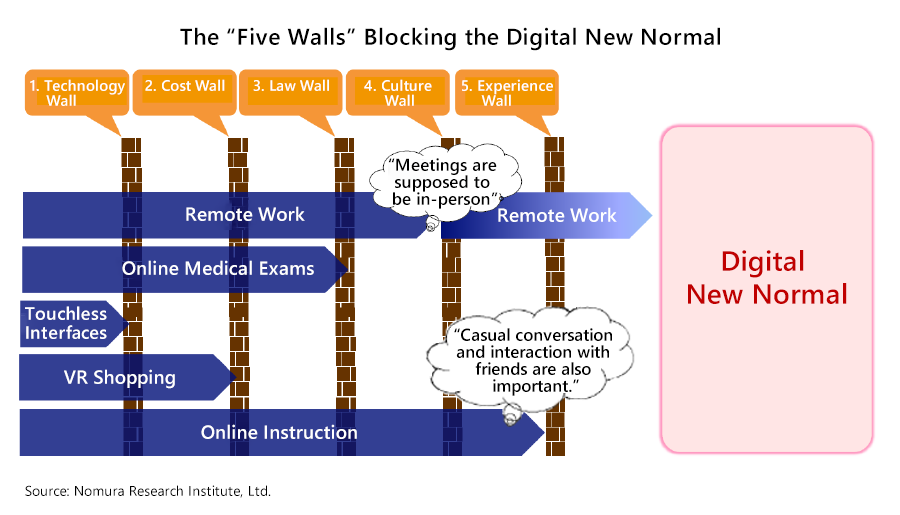Technologies that will Drive the Post-Corona Digital New Normal
#DX
Jul. 17, 2020
Amid the ongoing spread of Covid-19 infections, the search for new behavior patterns that anticipate the aftermath of the pandemic (post-corona) have begun around the world, and technology utilization is expected to play a key role in this new normal for society. We spoke with Makoto Shirota and Atsushi Kametsu, knowledgeable observers of cutting-edge technology trends at Nomura Research Institute (NRI), to find out what types of technologies will support this new lifestyle.
Digital technologies contributing to new life- and workstyles
Experiments in digital technology utilization have moved forward aggressively to prevent the spread of the Covid-19 infections. The smartphone apps etc. that verify contact with Covid-positive individuals, which have come into use in Japan as well, can be considered a representative example of the trend.
Shirota explains that a wide range of technologies are already being utilized to prevent the spread of Covid-19 infections. These initiatives are numerous and diverse, from smart helmets capable of measuring body temperatures in 13 people simultaneously, to studies in using wearable devices to acquire data including body temperature, heart rate, and blood oxygen saturation, and then analyzing that data to predict Covid-19 infections, to cases where design drawings for individual protective gear that can be made with a 3D printer have been published free of charge.
Shirota further observes, “New lifestyles and workstyles are being proposed to encourage everyday actions against the spread of Covid-19 infections, and digital technology is making major contributions to bringing about these changes. I define ‘digital new normal’ as the new world that will be realized through these efforts.”
One technology cited by Shirota as worth following in the new society is non-face-to-face sale systems. With these systems, it will be possible to continue the sales and marketing activities that are so important for many companies, even when those companies must avoid human contact.
Shirota explains, “Current web conferencing systems require users to connect with a URL and password that have been sent to them in advance, but among general consumers, there are many people who have trouble with complex operations or interfaces. We will need to make connecting easier if we want to expand utilization going forward."
As a means of supporting day-to-day life when it is difficult to go outside, Shirota mentions technologies that will create more sophisticated e-commerce experiences. When, for example, a consumer tries to use online shopping to buy clothes, unlike when shopping in stores, there is no easy way to try on the products to see if they suit the customer. Digital technology utilization will make it possible for users to sample products online.
As a specific example, Shirota cites Warby Parker, an online eyeglass seller in the United States. Shirota explains, “When your face moves in the frame, the virtual glasses follow your face as captured by the camera, allowing you to see whether the glasses look good on you. This is a very interesting example that is being achieved using AR (augmented reality) technology.” Shirota predicts that these types of virtual fitting room needs will be more and more common going forward.
However, after introducing the various technologies, Shirota also points out that for any of them to spread in society and be incorporated into the digital new normal, they will need to overcome the five walls of “technology”, “cost”, “law”, “culture”, and “experience”. Of the five, Shirota believes barriers of experience will be especially hard to overcome.
“For example, online classes are possible with the current technology as long as they merely involve listening to the teacher, but casual interaction with friends is just as essential a part of student life, so it’s not enough just to enable schools to hold classes. I think it will be important for the digital new normal to overcome the five walls, including experience issues of this kind.”

Protecting the health of the people working in offices
In thinking about preventing Covid-19 infections from spreading in the workplace, Kametsu believes the essential first step must be to avoid the “three Cs” (closed spaces, crowded places, and close-contact settings). As a specific metric, he says employees should sit at least two meters apart.
A glance at overseas companies reveals that many specific initiatives are already underway, including social distancing protocols at Amazon warehouses in the U.S., and in-office employee behavior tracking at Alibaba in China.
Kametsu notes that policies to protect the health of the customers and workers who visit offices are also necessary, citing NRI’s efforts as an example. “At NRI, we have installed thermal cameras at our office entry gates. When someone with a high temperature tries to pass through the gate, an alert is displayed on the screen.”
As an additional example, Kametsu introduces “AI Camera for Meeting”, an NRI solution. This system uses small cameras to monitor meeting rooms, thereby detecting people without masks and prompting them to put masks on, or making announcements such as “Move your seats apart” when people are too close together.
After explaining these types of workplace coronavirus countermeasures, Kametsu adds, “The challenge here is that companies need to rethink how they will protect the employees they bring into their offices when they bring them into their offices.”
The threat of Covid-19 remains real, and its substantial impact on our lifestyle and our business is still being felt. While this situation continues, it is necessary for all of us to think proactively about what must be done to protect our lifestyles, our businesses, and most of all, our very lives.







